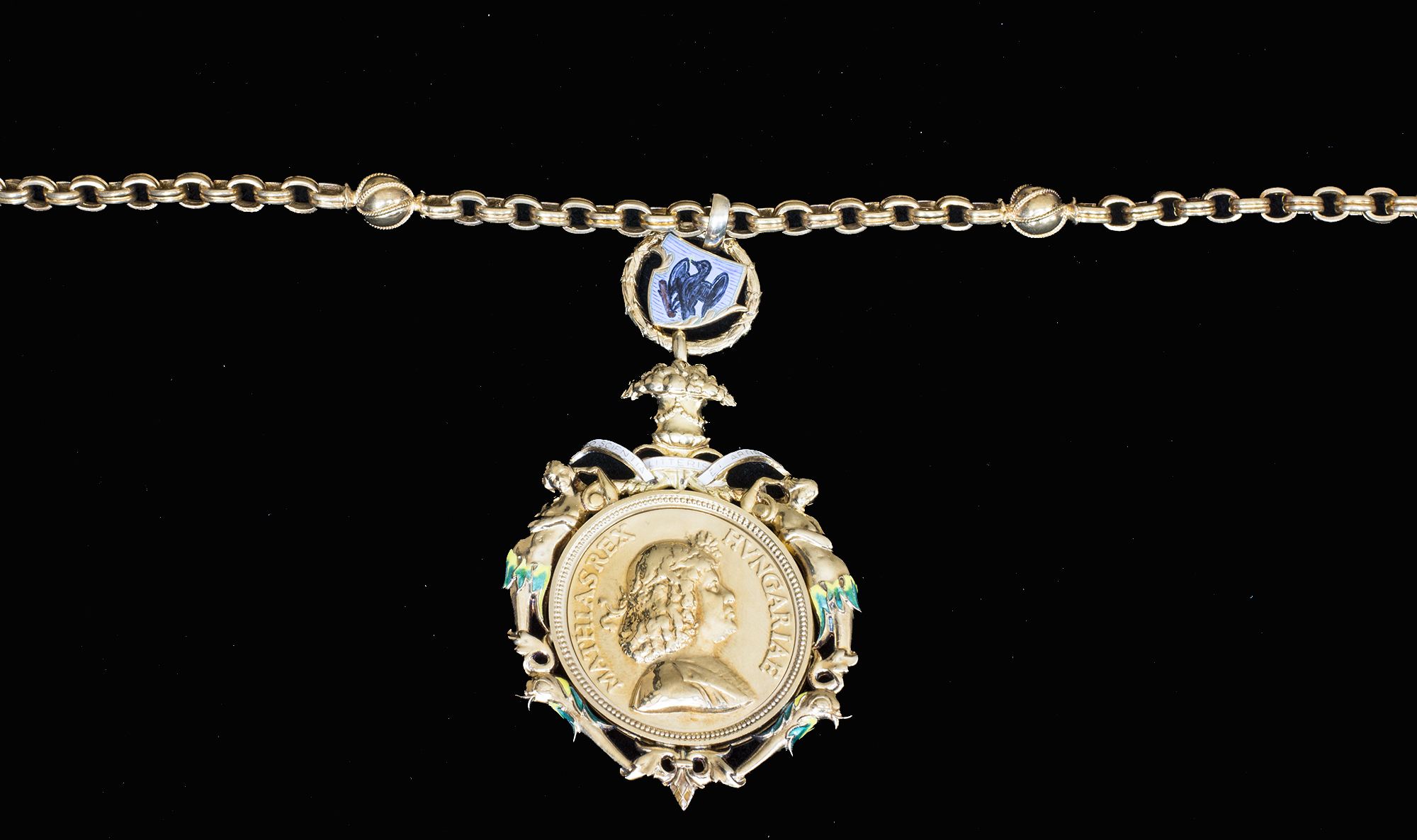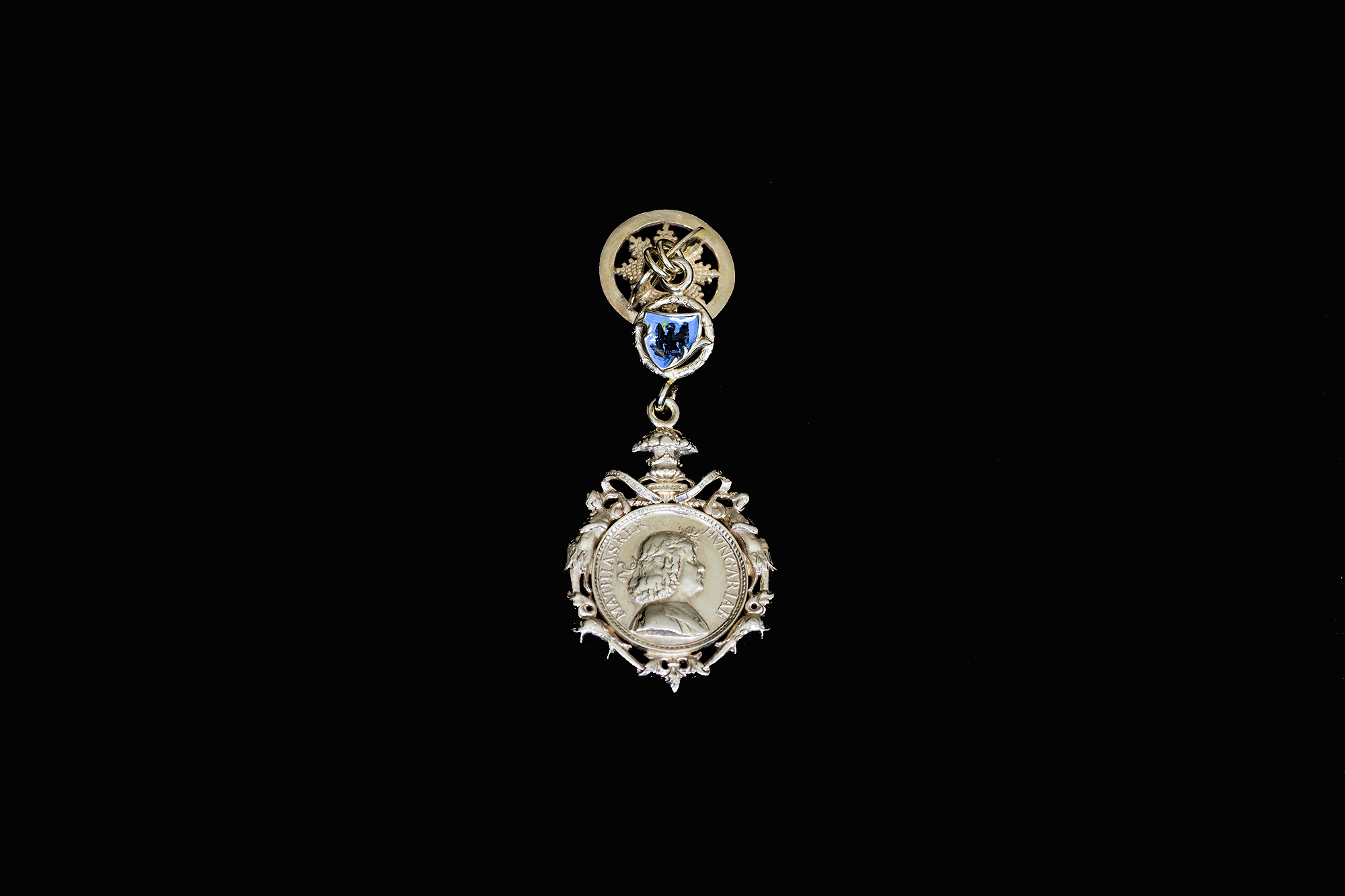History of the Hungarian Corvin Chain Award
Hungarian Corvin Chain

In 1930, Governor Miklós Horthy established the Hungarian Corvin Chain – together with the Hungarian Corvin Wreath and Hungarian Corvin Insignia awards – based on an idea of Minister for Culture Kuno Klebelsberg.
This award was bestowed upon those who achieved outstanding merit within the fields of Hungarian science, literature and art, or in the furthering of Hungarian culture.
The Corvin Chain Award is a copy of a thirty-five-millimetre diameter medal created by an Italian artist in the 15th century, which depicts a bust of King Matthias Corvinus in profile with the circumscription “Mathias Rex Hungariae”. The medal is surrounded by a richly decorated, partly enamelled, pierced circular frame with the inscription “Pro scientia – litteris – et artibus” along the upper circumference. Above the decorative medal can be found the enamelled coat of arms of King Matthias, which hangs from a gold-plated silver necklace. The total length of the pendant is one hundred millimetres. The miniature Corvin Chain is an identical copy of the pendant part of the Hungarian Corvin Chain Award in a size of forty millimetres.

The Award differed from other decorations in that the winners of the Hungarian Corvin Chain and Hungarian Corvin Wreath Awards formed a Board with its own statutes. The Board had the right to decide on future Award winners.
Honorees of the Corvin Chain
The number of persons honoured with the Corvin Chain was limited to twelve, while later on this quota was raised to fifteen. The Corvin Chain was awarded to twenty-four persons between 1930 and 1943:
1930
Albert Berzeviczy cultural politician, historian
Ernő Dohnányi composer
Ferenc Herczeg writer
Hubay Jenő composer
Count Kuno Klebelsberg minister of religion and education
Baron Sándor Korányi internal specialist
László Ravasz Calvinist bishop, theologian
Count Pál Teleki geographer
György Zala sculptor
Baron Gyula Wlassics cultural politician, lawyer
1935
Bálint Hóman historian
Bertalan Karlovszky painter
1937
Árpád Károlyi (1853–1940) historian, archivist
Jusztinián Serédi archbishop, scholar of church law
1938
Tibor Verebélÿ surgeon
1939
Dezső Hültl architect
János Melich linguist
1940
Artúr Balogh lawyer
Lajos Kelemen historian
Sándor Reményik poet
1941
János Pásztor sculptor
Gyula Rudnay painter
1942
Antal Schütz theologian
1943
Ferenc Lehár composer
*
The Corvin Chain Award was revived after fifty-eight years during the first Orbán government [Prime Ministerial Decree 2/2001 (VIII. 14)].
In 2001, twelve persons were honoured with the Award:
János Balogh zoologist (1913–2002)
Zoltán Kallós ethnographer (1926–2018)
Sándor Lámfalussy economist (1929–2015)
László Lovász mathematician (1948–)
John Lukács historian, writer (1924–2019)
Imre Makovecz architect (1935–2011)
István Nemeskürty literary historian (1925–2015)
György Oláh chemist (1927–2017)
Magda Szabó authoress (1917–2007)
Sándor Szokolay composer (1931–2013)
Ede Teller physicist (1908–2003)
Vilmos Zsigmond cameraman (1930–2016)
The Board of the Hungarian Corvin Chain Award winners elected István Nemeskürty as its Chairman and Éva Matron as its Vice-Chairperson. The secretarial tasks and the administration related to the operation of awarding process was executed by the Hungarian Corvin Chain Office led by Mária Schmidt between 2001 and 2002.
Following the change of government in 2002, the bestowing of Hungarian Corvin Chain Awards was stopped, and the Board of the Hungarian Corvin Chain was unable to continue operating.
*
During the second Orbán government, Act CCII of 2011 on the Use of the Coat of Arms and Flag of Hungary and on State Awards set down the basic regulations of the Hungarian Corvin Chain:
The Hungarian Corvin Chain (hereinafter Corvin Chain) serves to acknowledge outstanding merits achieved in furthering Hungarian science and art as well as Hungarian education and culture. The Corvin Chain may be awarded to Hungarian and foreign citizens who accept the statutes of the Award and who are prepared to participate in the work of the Board of the Corvin Chain. This regulation is considered cardinal on the basis of paragraph (4) of Article I) of the Basic Law of Hungary.
Item 2 of Annex 2 of the Act limited the number of award winners to fifteen.
Professor György Granasztói was charged with heading the Corvin Chain Office revived in 2011. Following his recommendation, five persons were honoured with the Award:
Zsolt Bor physicist
István Jelenits Piarist monk, teacher
Zoltán Kocsis pianist, conductor
Éva Marton opera singer
Szilveszter Vizi E. physician, brain researcher
*
Act CXLL of 2016 on the Board of the Hungarian Corvin Chain set up the Board of the Hungarian Corvin Chain as a public body. Its members are the Corvin Chain awardees, its seat is the Róheim Villa at 45 Hermina út, 1146 Budapest. The supreme decision-making organ of the Board is the general assembly of the members. The members elect a chairperson and a vice-chairperson from themselves. The administrative tasks related to the operation of the Board is executed by the secretariat, which is headed by the secretary-general elected by the General Assembly. After the death of Professor Granasztói, academician István Klinghammer took over the direction of the Hungarian Corvin Chain Office in June 2017. Upon his recommendation, seven persons were honoured with the Hungarian Corvin Chain Award on 12 February 2018:
Péter Huszti actor
Miklós Maróth orientalist academician
János Martonyi foreign minister
Miklós Melocco sculptor
Sir George Radda (György Károly Radda) biochemist
Zsigmond Ritoók classical scholar academician
Péter Sótonyi physician academician
The number of members in the Board increased to fourteen with the new award winners, and it became possible to form the Hungarian Corvin Chain Public Body. The General Assembly elected academician Szilveszter Vizi E. as its chairman, confirmed Éva Marton in her position as vice-chairperson, and charged academician István Klinghammer with the duties of the secretary-general.
*
The public body works on the principles of self-government. The Body is engaged in promoting sciences and art as well as the Hungarian national education and culture, and protects the prestige of the Hungarian Corvin Chain Award. The Board expresses its opinion on whether those who have been recommended to receive the Hungarian Corvin Chain Award are, while taking into account the individual’s public activities, worthy of the Award based on their work in the field of Hungarian science, literature or art and/or their services towards the furthering of Hungarian national education and culture; may make recommendations or publish official statements in the public interest with regard to these.
